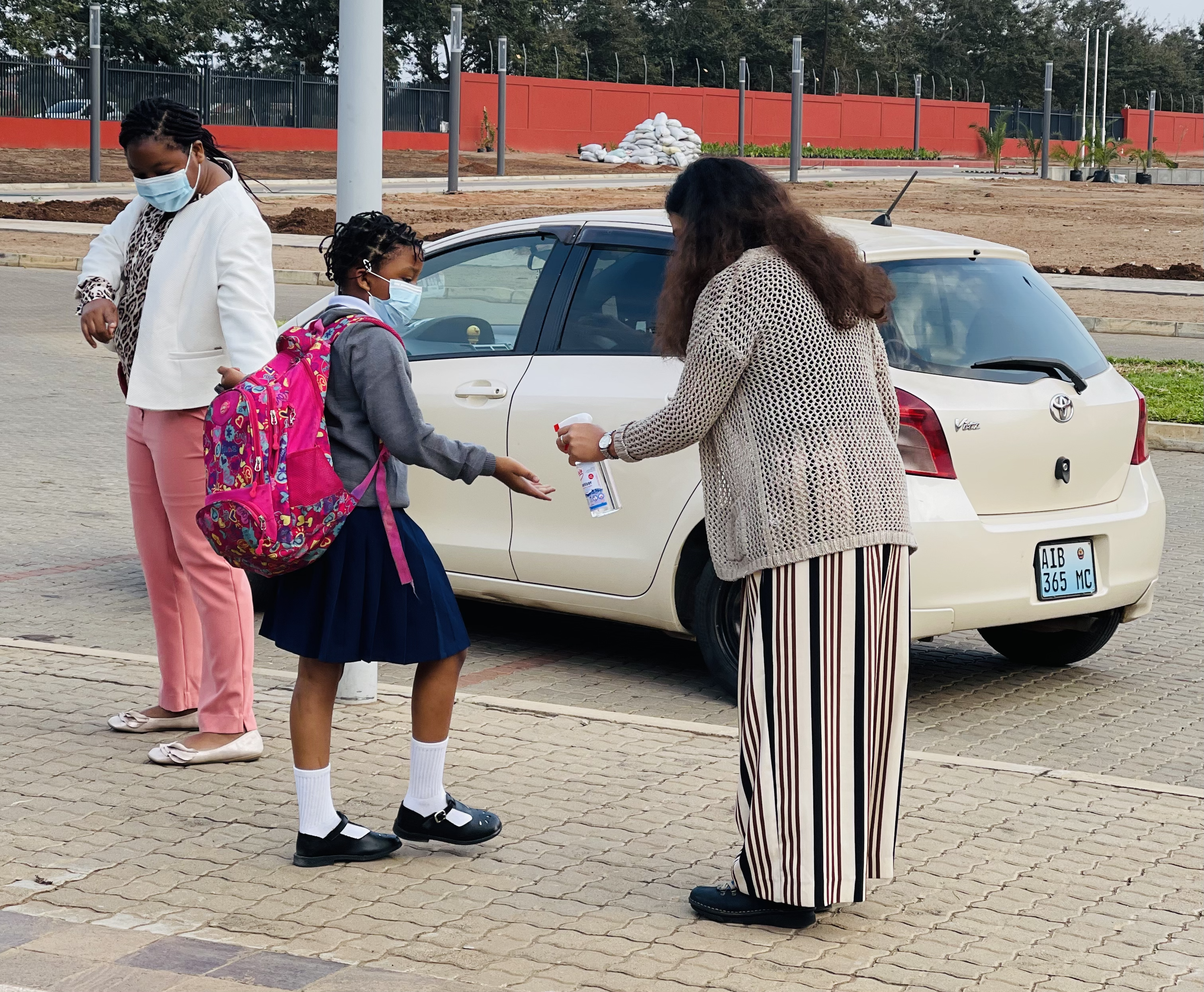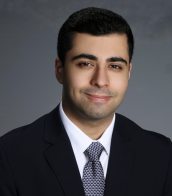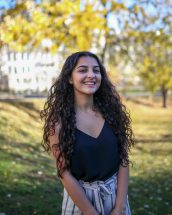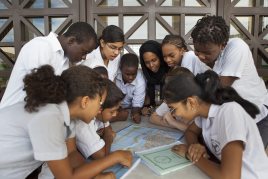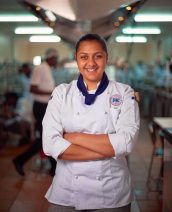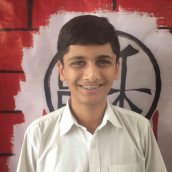At the Aga Khan Academy Mombasa, Ham Serunjogi – CEO and co-founder of African fintech giant Chipper Cash – realised the importance of staying connected to something larger than himself. The Forbes 30 Under 30 honouree is now serving as an advisor to the US President on African diaspora engagement.
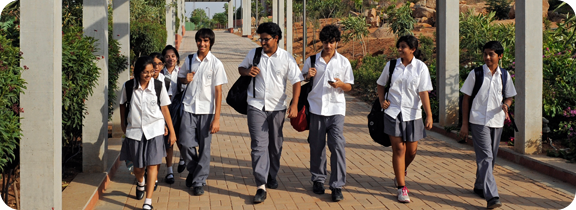
The vision for Aga Khan Academy graduates
Students at an Academy pursue a well-balanced education combining intellectual inquiry, academic excellence, sporting and cultural activities, and a grounding in ethics and moral reasoning.
They are committed to rigour and self-discipline in their studies and subscribe to the principles of intellectual honesty in the preparation of their work.
They respect their teachers and fellow students. They extend their respect to the cultural, religious and political convictions of others in school and in society. They dedicate themselves to debate issues honestly and fairly. They aim to understand and recognise the value of other views even as they value their own.
They are self-aware and socially conscious. They are committed to the development of their communities, their nation and civil society in the world at large. They are motivated to help others less fortunate than themselves.
They strive to acquire knowledge as part of a balanced, lifelong process of inquiry that leads to intellectual and personal growth, as well as a means to fulfil material goals.
The mastery of a particular discipline is balanced by a broad knowledge of several subjects, including science, art, literature and music.
They are also citizens of the world and at ease in environments and settings other than their own. They are generous and tolerant towards other cultures and traditions.
They are bilingual or multilingual.
They embrace the rich diversity of the world while valuing their own identity.
Interested to know more about our graduates? See spotlights on our alumni
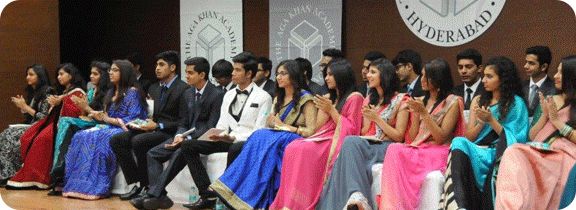
The vision for Aga Khan Academy graduates
Education at its best facilitates positive growth in all domains – intellectual, social, physical, ethical and spiritual – leading to the well-rounded development of the child. The Aga Khan Academies aim toward this ideal, and the values they espouse are reflected in each school’s aspirations for its students.
Students at an Academy pursue a well-balanced education combining intellectual inquiry, academic excellence, sporting and cultural activities, and a grounding in ethics and moral reasoning
They are committed to rigour and self-discipline in their studies and subscribe to the principles of intellectual honesty in the preparation of their work.
They respect their teachers and fellow students. They extend their respect to the cultural, religious and political convictions of others in school and in society. They dedicate themselves to debate issues honestly and fairly. They aim to understand and recognise the value of other views even as they value their own.
They are self-aware and socially conscious. They are committed to the development of their communities, their nation and civil society in the world at large. They are motivated to help others less fortunate than themselves.
They strive to acquire knowledge as part of a balanced, lifelong process of inquiry that leads to intellectual and personal growth, as well as a means to fulfil material goals.
The mastery of a particular discipline is balanced by a broad knowledge of several subjects, including science, art, literature and music.
They are also citizens of the world and at ease in environments and settings other than their own. They are generous and tolerant towards other cultures and traditions.
They are bilingual or multilingual.
They embrace the rich diversity of the world while valuing their own identity.
Read more here.
Interested to know more about our graduates? See spotlights on our alumni
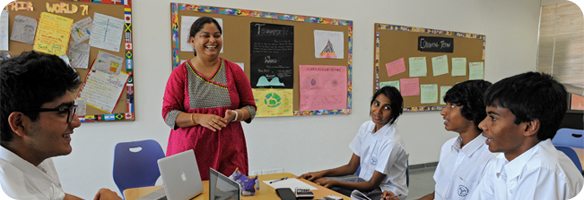
Job Opportunities
The Aga Khan Academy Hyderabad is committed to hiring the best educators and staff from within the local community, nationally and internationally. We welcome your interest in working with us and invite you to explore the opportunities available.
About the Aga Khan Academy Hyderabad
Set on a stunning 100-acre campus, south of the historic city of Hyderabad, the Aga Khan Academy Hyderabad is part of a network of Academies, which will soon form an inter-connected global learning community of 18 schools in 14 countries. Based on the vision of His Highness the Aga Khan, the Academy recruits exceptional students from diverse backgrounds irrespective of their ability to pay. Our holistic educational philosophy, International Baccalaureate curriculum and commitment to pluralism enables students to become ethical leaders who are empowered to make positive contributions in an ever-changing world. To find out more about the Academy, click here.
Working at the Aga Khan Academy Hyderabad
Here at AKA Hyderabad, we are united in the belief that education can be a force for good in the world. We look for outstanding educators whose work is characterised by passion, the ability to inspire others and make a difference, and work that is committed to helping students find their grand passion in life.
We recognise that the knowledge, skills and experience of our staff are a vital part of achieving our commitment to excellence. The Academy is strongly committed to continuing education for our faculty, and we provide regular opportunities for professional development.
The Academy is also proud to offer an outstanding work environment with excellent facilities, and a unique and diverse school community.
Current job opportunities
- Primary Years Programme teacher
- Art teacher (Primary Years Programme/Middle Years Programme)
- EAL specialist
- Math teacher (Middle Years Programme/Diploma Programme)
- Humanities teacher (Middle Years Programme/Diploma Programme)
How to apply
- CV (two pages)
- Cover letter (one page)
- Two references and their contact information
- A 250-300 word personal statement on how the Academy's vision and values find expression in your own life and teaching.
For more information on each of the vacancies, visit the AKDN Career Centre. Listings are updated regularly, so be sure to check back often.
Meet Our School Community
The students, faculty and parents of the Aga Khan Academy Hyderabad are a socially conscious group of people committed to the development of their communities, their nation and civil society in the world at large. They understand that knowledge is a lifelong process of inquiry that leads to intellectual and personal growth. In this section we offer vignettes of members of the Academy family who are driven by the common goal of making a positive contribution to their society.
Interview with Alison Hampshire, Head of Academy in Mombasa
Students Cinzia Torriani (year 10) and Alisha Doshi (DP1) interviewed Alison Hampshire, the new Head of Academy at the Aga Khan Academy Mombasa. They discussed passions, dreams, important themes in education and life lessons.
Hello Mrs Alison. Could you please share a brief background of yourself?
Hello girls! Of course! Well, I was born in Leeds, North of England, and I lived there until I was 17. I left home to attend the University of Sussex in Brighton, which is on the south coast of England. I studied for a music degree and was even a musician for a period of time! I then decided to train to be a teacher and started my teaching career in Brighton. After a little while, I got involved in theatre and became involved with a theatre group. I then ended up in Africa teaching, went back to England, ended up in Hong Kong, then Malaysia, and now back in Africa – Kenya more specifically.
If you were to describe yourself in a sentence, what would it be?
I think in a sentence I would describe myself as honest, passionate about education and protective. I am like a lioness and will protect the people that I am looking after, and that would include my students, my staff and my own family. My birth sign is actually a Leo, and my animal in the Chinese culture is a tiger, so I could see myself as a tiger and a lion – both loving yet protective animals.
Those are very important traits in a person. Similarly, what are the two things that you are not?
I know that I am not a mean person. I am not a very sporty person either!
Can you please tell us a little more about yourself and your family, for our readers to get to know you better? Is there something about yourself (a few interesting facts) that you would want students to know?
One of the things that perhaps people don’t know about me is that I really, really like heights, which is why I have done many activities that involve taking the risk of jumping out of an aeroplane, abseiling or even paragliding. I have done a number of things that require me to take a risk. And so, although I am sometimes hesitant, every time I have a birthday ending with 0, I like to give myself a new challenge and do something that is very difficult for me. There is nothing greater than accomplishing your goals.
The other thing is that I really like spicy food, so if I’m ordering a curry and the option is mild or hot, I would go for the hot one!
What is the most valuable life lesson you have ever learnt that you feel has had the biggest impact on you as a person?
One of my most valuable life lessons was when I was only 15. It was the first time that I ever felt that I had failed. When I was young, I played the flute and I received a distinction on every exam that I took, until I did my grade 6 (bronze level) exam where I got a merit. In the scheme of things, that’s not terrible, but it was devastating for me, and the life lesson I learned was that you have to pick yourself up, brush yourself off and try harder next time.
I was not prepared to proceed to grade 8 (gold level) until I was convinced that I was going to get a distinction, and so I worked and worked and worked and eventually that’s what happened. But the feeling I got when I was disappointed in myself was really hard, and the lesson I learnt was that sometimes you just have to forgive yourself and carry on.
What made you choose education as a profession? Is it a calling, a service, an agency or a love?
I started out as a musician and then realised that it wasn’t what I wanted to do with my life. It was selfish in a way – it was about being the best you could be, it was a very competitive environment. Also, while growing up at school, people had always said to me that I was such a good teacher. And so when the music didn’t work out as a profession, I looked to other options and tried many things out before deciding to be a teacher, but when I finally did decide to be a teacher I knew it was the thing I should have been doing from the beginning.
What values do you promote in terms of a learning environment?
I find that English literature provides all sorts of scenarios by which students can engage with issues and also aids in developing empathy. And I think that, as an English teacher, the important thing you need to develop is for students to be able to step inside another world and think about the lives of others.
And so the novels that I choose would possibly be about those that have challenging themes. I remember teaching To Kill A Mockingbird in a school which was entirely white, to help a rural British community understand the challenges of the themes in that novel. It was a very interesting experience. I also find that this is what literature can do – it can help us to see other people and other people’s worlds, and help us develop our understanding of different perspectives and ideally empathy for others.
I completely promote pluralism – it is also one of the main things literature can do. I remember having read the Chinua Achebe trilogy, and it was the beginning of my love for stories, literature and the love for Africa as well.
Why the Aga Khan Academy Mombasa?
Mostly because of the vision and the mission of His Highness. I completely believe that education is about empowering young people and that it is about change. I have always felt that I have gone into education to make a difference, not necessarily one that I can make but one that can be made through the lives of others through young people. And so, when I came across the mission and the vision of the Academy, it really seemed to synchronise with my own values. The other attraction was that having lived in Africa for my very first posting outside of Britain, the thought of returning was very exciting.
The community of students here is one that I felt was interesting to join. To be honest, in the past I have never worked in a situation where there were local teachers in an international school – it has mostly been expatriate teachers, and I found that to be a very exciting prospect.
What is something you have never done before and you may be able to do here in Mombasa?
I have never eaten a whole lobster! Actually, I would love to learn how to kite surf over the next few years. I would also really like to go and find some great African music and spend a whole night dancing!
What is your take on the students at the Academy, based on your interactions with them thus far? Do they measure up, in terms of mindset and potential, to those you have experienced in the west?
I think it is really hard to generalise a whole student body, especially with the regard to the fact that I have mostly taught in the east in Asia rather than in the west, but there is definitely a big difference between students in England and students I have taught in an international setting.
I have found that students here are really open and really social, very welcoming, and they seem quite interested in the adults in their lives. They are polite and also seem to be inquirers. My most intense experience was when I went on the DP1 trip, and I felt that the level of interaction the students had with each other showed great compassion with one another. They asked great questions, seeming to be very interested and open-minded, which are very good traits.
Is there a favourite quote or saying or aphorism – a thought that you live by, a statement that encapsulates your personal view?
There is a quote by Gandhi which I live by, and it encapsulates my personal view. It is basically about self-esteem and states that nobody else is in charge of your happiness, other than yourself. It is “Nobody can hurt me without my permission”. I think that how you react to a situation is in your control, and over time I have learnt that it is nobody else’s power to do anything to you; physically they can, but emotionally how I react is how I am – which is the lesson I have learnt.
Finally, is there anything else you’d like our readers to know about you?
The really important thing that I would want to let everyone know is that I am having a lot of fun so far, and I am really enjoying my time here, and I hope that carries on.
Sazil Ramani – an ‘Academy advocate’ for service and social change
– Sazil Ramani, grade 10, Aga Khan Academy Hyderabad.
Sazil joined the Academy at its inception in 2011 and has since discovered many passions and predilections. “After coming here, I realized that I have a talent for photography, and am pretty good at design too. This year, I got to not only act in the annual summer productions as part of our drama class but also designed the posters and brochures. The Academy has given me many opportunities to prove myself, and I am sure this will help me in choosing a career in the future.”
His favourite subject is science, because he likes discovering new things, especially with regard to the realities of life and our surroundings. In particular, he enjoys scientific pursuits because they provide appropriate evidence to back the claims they make, and this makes it possible to persuade others towards positive social, economic and political change. Sazil aspires to be a mechanical engineer.
“As I am a residential student, I get a lot of opportunities to experience different aspects of life at the Academy,” says Sazil. “What I find most unique is the studious and peaceful environment, the greenery around us, the people from different backgrounds and cultures living with us, the facilities provided and the number of opportunities we get to prove our talents.”
Sazil’s biggest role model is His Highness the Aga Khan. “His hard work and dedication, his vision of a better world and his mission to improve the quality of life of those less fortunate. I have a similar vision and that’s why he inspires me.”
Watch a video Sazil made compiling visual anecdotes of diverse service experiences of his classmates and himself at various government school sites.

